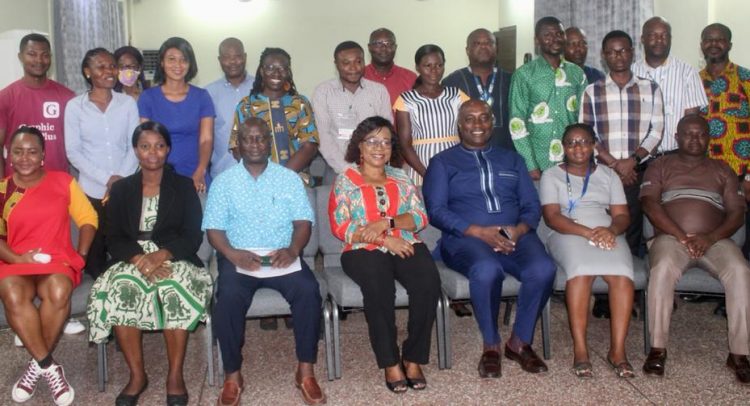The journalists with staff of the KHRC
The Ghana Health Service (GHS) has announced it would be expanding the vaccination of children against malaria as it moves towards the elimination of the disease in the country.
This announcement follows the $5 million funding approval by the World Health Organisation (WHO) after the successful completion of the pilot which started in April 2019 in six regions-Bono, Bono East, Ahafo, Central, Volta and Oti.
The piloted of the first malaria vaccine, RTS, S, saw the administering of over one million vaccine doses to children below age four in the six selected regions. The country is currently at the end stage of the pilot evaluation.
In October 2021, the WHO gave the recommendation for the widespread use of the vaccine in malaria endemic countries.
Researcher at the Kintampo Health Research Centre (KHRC) and Project Manager, Malaria Vaccine Pilot Evaluation in Ghana, Dr. Thomas Gyan, said children in the pilot districts would be considered first in the vaccination scale-up.
“In Ghana, we had six regions, in each region, half the districts were given the malaria vaccine and the other half were not given. So, after the WHO recommendation, these districts will start the implementation of the malaria vaccine by the close of this year then plans would be put in place to roll out to the rest of the country,” Dr. Gyan said.
He was speaking with journalist from the African Media and Malaria Research Network (AMMREN) during a field trip ahead of the 2022 World Malaria Day on April 25, themed, “Advance quality, building resilience and ending malaria.”
Dr. Gyan said the pilot received a high acceptance rate which positively impacted the vaccination coverage. “Initially people had difficulty accepting the vaccine but they eventually consented because of the high level of sensitisation,” he said.
He also noted that the vaccine had had a significant impact on severe malaria reducing mortality by 9 per cent according to available evaluation results.
“Admissions with children presenting to the hospital with severe and cerebral malaria have also reduced,” he added.
Director-General of the GHS, Dr. Patrick Kuma-Aboagye, speaking during a press conference said eliminating malaria would require the mobilisation of needed resources to scale-up proven and effective interventions equitably to those who needed them.
“We need to build resilience, which will entail building systems and strategies that are sustainable beyond donor support to eventually end malaria,” he added.
By Jamila Akweley Okertchiri, Kintampo


